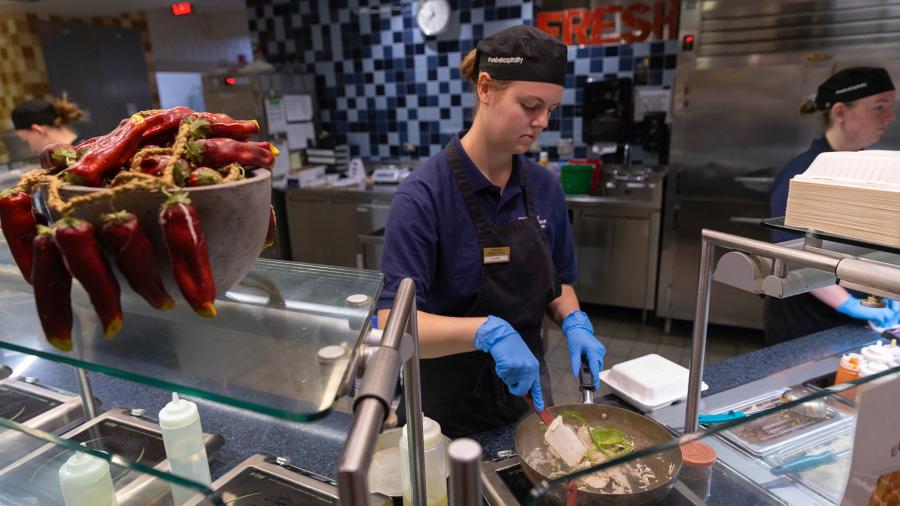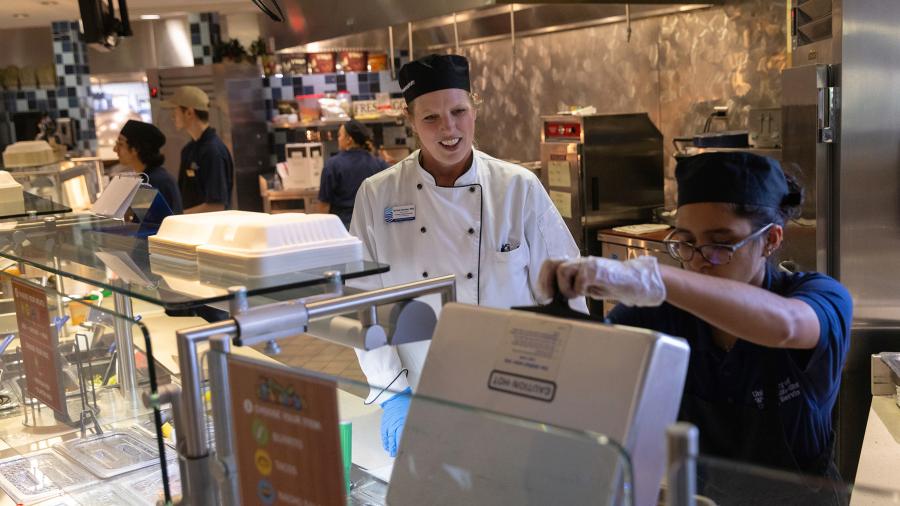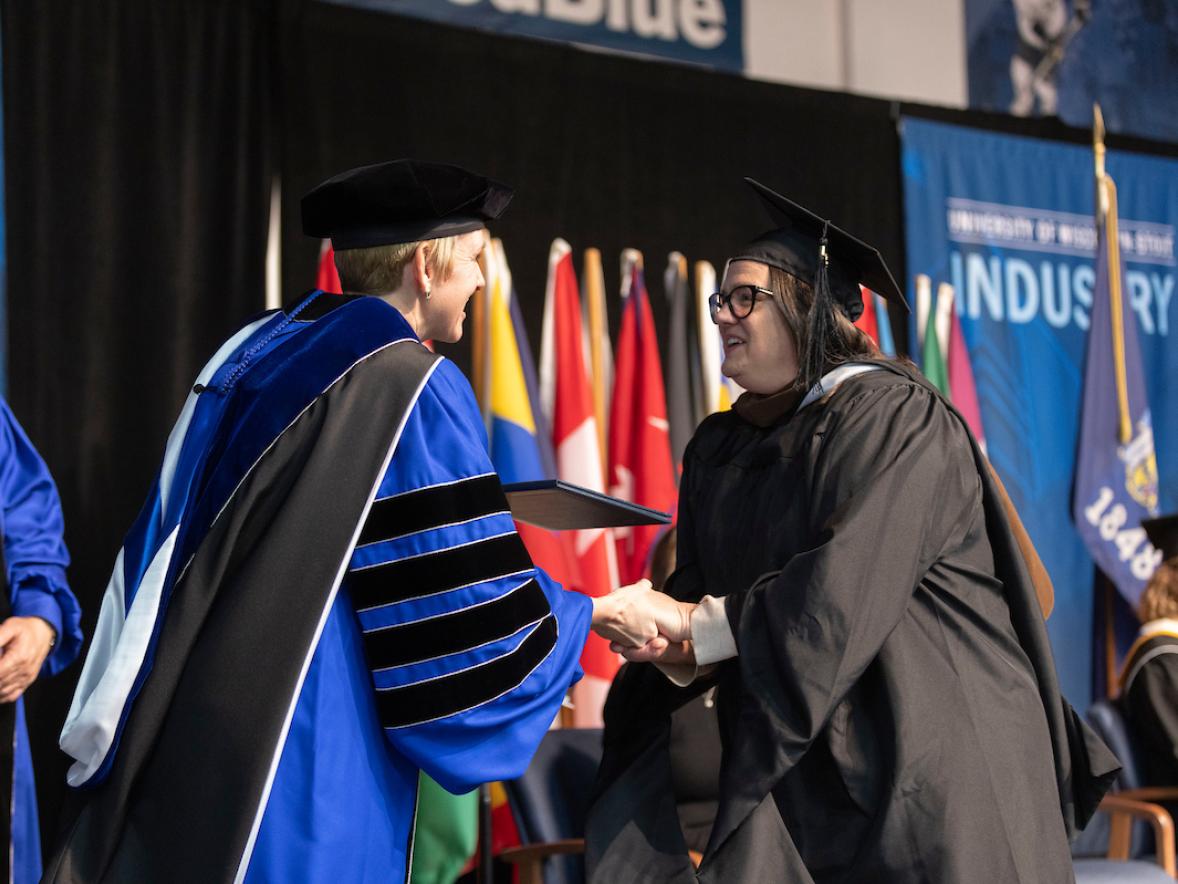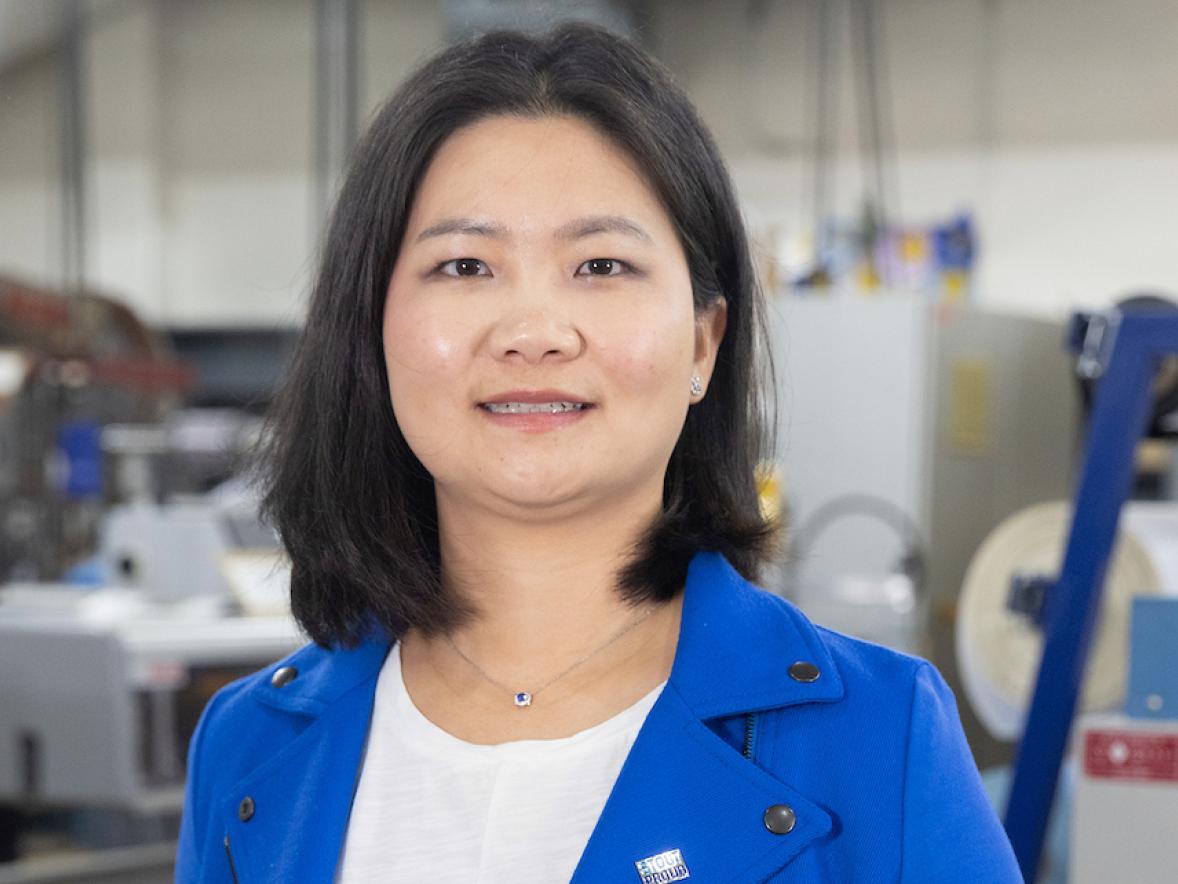For a group of Fireside Café student employees at UW-Stout, lunchtime this fall also means lab time.
On Tuesdays and Thursdays in the Memorial Student Center, they prep the made-to-order restaurant for its 11 a.m. opening, then greet customers and prepare orders such as stir fries, paninis and burritos throughout the middle of the day.
They are more than part-time University Dining Services employees: They also are students majoring in hotel, restaurant and tourism management and in dietetics, gaining a deeper understanding of how restaurants operate and how food is prepared and served so that they are ready to manage similar operations, if they choose, during their careers.

Dressed in University Dining Services’ blue and black uniforms, the Food Service Production and Operations class leads customer-facing operations at the popular restaurant, which fills 200 to 300 orders a day.
It's a real-life lab — true hands-on learning — with hungry guests expecting a good experience. “You wouldn’t think of this place as a classroom,” said Ada Stenstrom, an HRTM major from Wausau, as she surveyed her classmates busy behind the glass counters filled with various entrees.
“Students are seeing every aspect of operations,” Professor Kristal Gerdes said. “They’re gaining more valuable experience than they could get in a traditional lab. It’s a perfect marriage of academics and Dining Services.”
HRTM is one of UW-Stout’s executive hospitality management programs, which earlier this year were ranked in the top 10 in the world by CEOWorld magazine.
Managerial training
At Fireside, which is near a fireplace on the second floor of a dining and student lounge area, students are gaining management-level experience in several ways.
Beginning Tuesday, Nov. 5, for about two weeks, each student will be responsible for creating an entrée that will be featured during lab time at the Comfort Zone station. They also will test the recipe, order the food through university suppliers and oversee preparation of it.
Students are learning about food costs, industry-standard software, how to work with a budget and how to collaborate with a chef, Executive Chef David Leach, who was trained at the Culinary Institute of America.
They also are gaining knowledge about and using state-of-the-art restaurant equipment.

“We are not training students to be chefs, but we want them to know enough about the kitchen side so they can hire the right chef,” Gerdes said. “This experience is teaching them how to be good leaders in the hospitality industry. It’s a level of experience they need.”
When the course began, Dining Services Associate Director Jason Horzewski, a certified ServSafe instructor, held a classroom training session on how to safely handle food. Students now can add the ServSafe Food Handler certification to their resumes.
Class members work at a serving station for two days, then rotate to the next one. Before they move on, they act as trainers — training the classmates who will replace them.
The six food stations have more than 50 menu items that students need to know how to prepare and serve. Also, they stock a grab-and-go area and oversee the pay station.
Stenstrom had previous restaurant kitchen experience and in catering — a field she hopes to go into — but is pleased to be seeing all aspects of the Fireside operation. “This has helped me solidify my customer experience and interaction,” she said. “It’s like an internship.”
Mobile ordering also is available at Fireside, meaning students need to check printouts and prepare those orders for pick-up.
“By the end of the semester they could run shifts by themselves. They will be like student managers,” said Justin Krahn, director of Dining Services. “They have rotations in every area and are learning different food preparation techniques.
“We’re about the total student experience, not just food,” Krahn said, noting that Dining Services employs about 250 students across 12 food service operations on campus.
Alternative needed with Heritage Hall renovation
The idea for the Fireside lab experience came together about a year ago. Typically, students get restaurant training at the Heritage Hall Corner III Café, which is open to the public only as needed to support classes. However, Heritage Hall will be renovated starting in spring 2025, and an alternative restaurant and kitchen site was needed for at least the next two years.
“The Heritage renovation is what brought this course to the forefront. There were some discussions about how we could collaborate,” Krahn said.
Gerdes, Krahn and Horzewski along with Dining Services Unit Manager Jenny Ecklor and Food Service Manager Lindsay Schade have a good feel for how the class can be a valuable experience — they are UW-Stout alumni and graduates of the HRTM program.
Gerdes, Krahn and Horzewski along with Dining Services Unit Manager Jenny Ecklor and Service Manager Lindsay Schade have a good feel for how the class can be a valuable experience — they are UW-Stout alumni and graduates of the HRTM program.
Gerdes said she is “so impressed” with the students. “They’re engaged with the customers and becoming very efficient in their jobs. I couldn’t ask for the class to be going better.”
The live lab also is filling a need: Fireside has struggled in the past few years with staffing shortages, forcing some station modifications and the restaurant to limit its hours. This semester the restaurant is fully staffed daily on its busiest days, Monday through Thursday.
In addition to getting an hourly wage during their lab times, students get a free lunch and can pick up more hours during other shifts if they choose.
In 2023, Dining Services received the state Regents University Staff Excellence Program Award. It’s one of five self-operated dining services in the UW System, meaning revenue is retained on campus.
Dining is aligned with university initiatives, including student experience. Student success is the leading goal of UW-Stout’s FOCUS2030 strategic plan.
###






